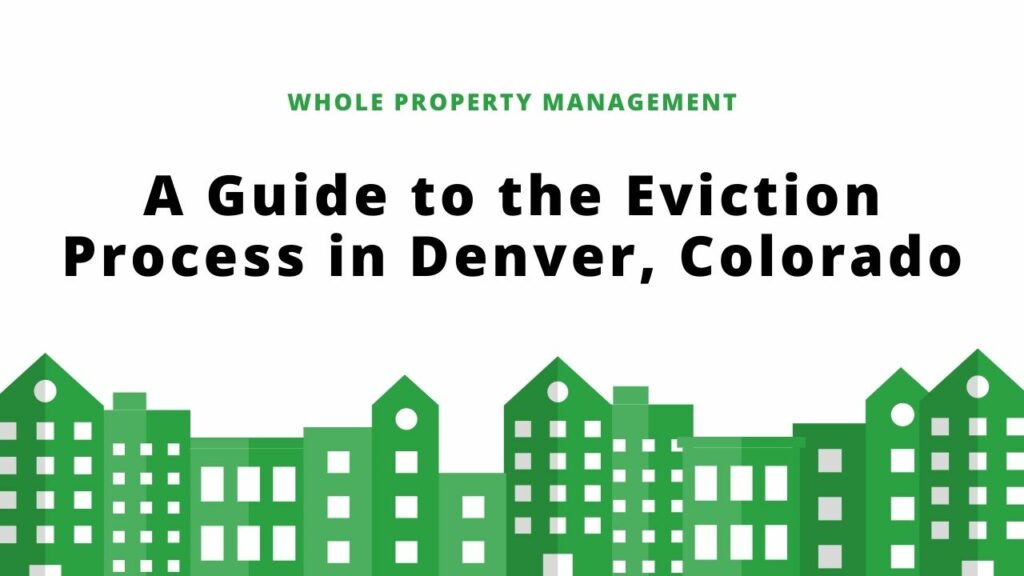A Guide to the Eviction Process in Denver, Colorado

A tenant has an obligation to abide by all terms of the lease. Such as paying the monthly rate on time, abiding by the rental policies, caring for the premises, and using the premises for rightful purposes.
While most tenants a landlord rents to in Colorado will often cooperate fully, some won’t. And when worse comes to worst, the landlord may be left with no other option but to evict them.
Colorado landlords must follow certain rules and regulations for a proper eviction. This eviction process can take anywhere from two weeks to four months. The exact time will vary on the type of eviction, and whether or not a tenant puts up a fight against it.
If you are considering evicting a tenant, have one who has broken their lease, or simply want to refresh your knowledge as a Colorado landlord, here’s a basic eviction process in Colorado.
Colorado Eviction Notice
This is the first step in eviction proceedings for landlords. The type of notice to serve and the process to follow depends on the ‘just cause’. A just cause is simply a legitimate reason for evicting a tenant, as the landlord cannot evict a tenant for just any reason or take money from their security deposit instead of evicting them.

Allowable reasons for landlords to perform tenant evictions in the state of Colorado include:
- Nonpayment of rent
- Intentional property damage to the unit
- Material noncompliance with the terms of the lease or rental agreement
- Engaging in illegal activities at the rental premises
- Failure to move out after the lease ends
The following are the eviction notices to serve for each of the aforementioned reasons.
Serving Notice Before Evicting a Tenant Who Doesn’t Pay Rent
The landlord must use this type of written notice to evict a tenant who refuses to pay rent as per the lease. The exact notice period depends on the tenancy type in the lease. For tenants renting “exempt” rental properties, the landlord must serve them a 5-Day Notice to Pay prior to going to court hearing date.
“Exempt” rental properties owned by the landlord, a maximum of 5 units. If the tenant pays the monthly rate within 5 days, you do not have to file an eviction action in court.
A tenant living in an employer-provided unit as per the lease, the landlord must provide them a 3-Day Notice to Pay. This will give the tenant three days to pay the overdue rent or move out.
And for all other types of tenancies, landlords must serve them a 10-Day Notice to Pay to avoid court precedings. Similarly, this will give the tenant a maximum of 10 days to either pay the overdue rent or move out.

If the tenant doesn’t pay the overdue rent or moves out within the notice period, the landlord should move to court for action.
Notice to Comply for a Lease Violation
Under Colorado eviction laws, landlords can also evict a tenant for failing to uphold the terms of the written lease agreement. According to the Colorado eviction laws, the landlord must first allow such a tenant to correct the violation prior to evicting them.
For tenants renting “exempt” properties, the landlord must provide them a 5-Day Notice to Comply. This will give the tenant 5 days to cure the substantial violation in order to avoid getting evicted.
For tenants who live in employer-provided housing, the landlord must provide them a 3-Day Notice to Comply. This will give them only 3 days to cure the violation to avoid an eviction action against them.
And for all other types of tenancies, the landlord must serve the tenant a 10-Day Notice to Comply. Similarly, this will give the tenant a maximum of 10 days to correct the violation to avoid an eviction.
Typically, lease violations that fall under this category include:
- Having a pet without the landlord’s authorization
- Exceeding the occupancy limit, or having individuals in the property, like unregistered an family member
- Causing deliberate damage to the rental property
- Breaches of the Fair Housing Act

Illegal activity belongs to a different category.
If the tenant fails to oblige and cure the violation within the time stipulated, then the landlord can move to court and file an eviction lawsuit.
Consider consulting a proffessional attorney for legal matters.
Notice to Quit for Tenants Who Have No Written rental or lease Agreement
Just because a tenant has no written rental or lease agreement doesn’t mean the landlord can evict them without eviction notice. The state of Colorado requires that you provide them with the proper notice, prior to beginning an eviction action.
- 1-Day Notice . You must serve this on a tenant whose tenancy lasts less than a week.
- 3-Day Notice. You must use this for tenancies lasting more than a week but less than a month.
- 21-Day Notice. You must serve this for a month-to-month tenancy that has lasted more than a month, but less than six months.
- 28-Day Notice. You must serve this on a tenant who lived in your rental unit for more than six months, but less than a year.
- 91-Day Notice. the landlordmust use this notice to evict a tenant whose tenancy or lease lasts at least a year.
Again, the landlord can proceed with the eviction if the tenant doesn’t comply.
Notice to Quit for Illegal Activity
In the state of Colorado, illegal activity includes:

- Drug-related felonies
- Damage caused to you or another tenant’s property
- Physical harm caused to you or another tenant
- Violent felonies
- Criminal acts that are public nuisances under local or state law
Summons & Complaint
Next, you must file a complaint in a relevant county court. The filing will set you back by anywhere between $85 and $135. After notarization by the court’s clerk, the summons will be issued by the court, and a process server will serve them to the tenant.
Court Hearing & Judgment
Once the court’s process server has served the summons on the tenant, the eviction hearing will occur between 7 and 14 days later.
If the judgment is made in your favor, the court will issue you a Writ of Restitution. This will be your tenant’s final notice to vacate the premises. Either the sheriff, their deputy, or the undersheriff may execute it by forcefully removing the tenant from the unit.
Eviction Process in Colorado: Bottom Line
If any portion of Colorado’s landlord-tenant law or the eviction process in Colorado still confuses you, consider getting in touch with Whole Property Management! Our experienced and knowledgeable team can take you through the laws and make sure you have the tools to succeed.
Disclaimer: This blog doesn’t constitute legal advice and isn’t meant to be a substitute for professional advice from a licensed attorney. For expert advice on this area or any other aspect of property management, Whole Property Management can help.
